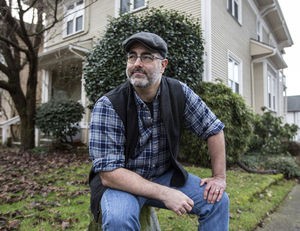Q&A with memoirist Jason Schmidt
This Q&A with author Jason Schmidt was published January 2015 in The Seattle Times.
 These days, Seattle is known worldwide as a glittering tech metropolis where 20-somethings take home six-figure salaries. Poverty is little addressed, and white poverty even less.
These days, Seattle is known worldwide as a glittering tech metropolis where 20-somethings take home six-figure salaries. Poverty is little addressed, and white poverty even less.
But in his coming-of-age memoir “A List of Things That Didn’t Kill Me” (Farrar, Straus and Giroux), Jason Schmidt describes the Seattle of his youth during the 1980s, where destitute kids like him wandered the streets until dawn, laborers scraped by on workers’ comp and nobody noticed that Schmidt, now 42, was being raised by a drug-addicted, gay, single dad who’d contracted HIV.
Schmidt’s memoir was released last week. A few doors from the Capitol Hill home where his story opens, he talked about translating a tough life into literature. This interview has been lightly edited for space.
You lived through some pretty horrific things — homelessness, beatings, hunger. How did it feel to write about those moments?
Exciting and scary. I was able to tell stories that I’d been keeping secret for all these years, and it became kind of addictive. When you tell a story at a party, you can read people’s faces, see how it’s hitting them. With this, you’re just sending it out into the world, and after that there’s nothing you can do.
You have a law degree and an interest in public policy. How did you make the leap to writing a literary memoir?
I started writing in high school, when I got access to a keyboard through my journalism class senior year at Garfield High School. I would skip classes and just type all day. I wrote awful science-fiction and fantasy stories — usually just scenes. Then in 1998, I entered the Writers of the Future contest — just as an experiment, really. And my story won.
But I still didn’t know what I was going to do with myself. By 2007, I’d started law school, thinking I would do public-service work. The teacher’s lecturing, and all of us are looking at our computer screens watching the Dow tank. I thought, I’d better make it as a writer.
Your book is marketed toward “Young Adult” audiences. How did you feel about being categorized that way?
The strength of YA [books aimed for kids from 12 to 18] is that it unabashedly tries to interpret the world we live in. Growing up, I never saw anything about my experience reflected. There was no “Roseanne.” TV shows were mostly aimed at people who had nothing in common with me. I’d go over to someone’s house and they’re talking about what they did over Christmas or Thanksgiving, and because it was the ’80s maybe they’d tell some gay jokes. But I couldn’t talk about what I did on my vacation.
So I loved the idea of doing YA in order to let readers know that they don’t necessarily have to stay hidden. There are a lot of 12- and 13-year-olds right now living with the same stuff I did — and a lot worse.
Do you envision kids reading this? It deals with some pretty adult material.
To some extent, the YA question is a bit academic. You’re trying to write something that’s true. I want readers, whatever age they are, to have that thrill of going, “Totally! I totally have done that. I totally have seen that. I know exactly what you’re talking about.”
As far as people thinking it’s too harsh for young readers, I can guarantee parents and teachers that most people who are 12 and 13 years old are at least thinking about the stuff that’s in this book.
Writing coaches often advise against writing in anger, especially with memoir. But you depict your father doing some pretty terrible things. Have you forgiven him?
I don’t know if it’s necessary to forgive people to write memoir. In my case, it’s complicated. There’s a lot of ways to look at him in our relationship. At one point, I was very angry. But later, I saw that he had a lot stacked against him. He was a single dad raising a kid; on the other hand, he was dealing drugs. There’s an idea in our culture that somebody has to be virtuous to deserve basic human dignity. My dad wasn’t necessarily virtuous — I see a lot of moral cowardice and selfishness in him — but I can’t deny that I owe him a lot.
He had a great sense of humor, and he took me on hikes, bought me books. It was very important to him that I have an internal intellectual life and think critically about things. So he cared. One of the things you learn when you’re raised by criminals is that most people have a reason for doing the things they do.
How did you feel when you finished?
Terrified.
What do you think your father would think of this book?
He’d hate it.
So many memoirs about surviving abuse or overcoming deprivation are written by women. Why do you think that is?
All stories are parables, and men, especially, may feel you’ve got to come out victorious in the end — you go out and you win. As opposed to the parables I grew up with: Don’t leave any fingerprints. Everybody’s life story is really a list of things that didn’t kill them.
Click here for my review of Schmidt’s memoir.
